Submitted:
17 May 2024
Posted:
20 May 2024
You are already at the latest version
Abstract
Keywords:
I. Introduction
A. Relevance of the Subject
B. The Aim of this Study
C. Literature Review
II. Materials and Methods
A. Data
B. Analytical Methods Applied and Software Used
III. Results and Discussion
A. General Characteristics of Field ‘IEEE Terms’ Data
- School of Electrical Engineering and Automation, Wuhan University, Wuhan, China
- Department of Electrical Engineering, Tsinghua University, Beijing, China
- School of Electrical Engineering, Southeast University, Nanjing, China
- College of Energy and Electrical Engineering, Hohai University, Nanjing, China
- School of Electric Power Engineering, South China University of Technology, Guangzhou, China
- School of Electrical Engineering, Southwest Jiaotong University, Chengdu, China
- School of Electrical and Electronic Engineering, Nanyang Technological University, Singapore
- School of Electrical Engineering, Beijing Jiaotong University, Beijing, China
- State Key Laboratory of Alternate Electrical Power System with Renewable Energy Sources, North China Electric Power University, Beijing, China
- School of Electrical and Information Engineering, Tianjin University, Tianjin, China
- College of Electrical Engineering, Sichuan University, Chengdu, China
- Department of Electrical Engineering, Indian Institute of Technology Delhi, New Delhi, India
- College of Electrical and Information Engineering, Hunan University, Changsha, China
- Department of Energy Technology, Aalborg University, Aalborg, Denmark
- College of Electrical Engineering, Zhejiang University, Hangzhou, China
- State Key Laboratory of Advanced Electromagnetic Engineering and Technology, School of Electrical and Electronic Engineering, Huazhong University of Science and Technology, Wuhan, China
- National Renewable Energy Laboratory, Golden, CO, USA
- National Mobile Communications Research Laboratory, Southeast University, Nanjing, China
- The dominance of affiliations with Chinese institutions is evident.
B. IEEE Terms Clustering Results Obtained Using VOSviewer Program
C. IEEE Terms clustering results obtained using the Scimago Graphica program
D. IEEE Terms Clustering Results Obtained Using Multidendrograms Program
E. IEEE Term Co-Occurrence Estimates Obtained Using the Fpgrowth Utility
- Voltage_control → Renewable_energy_sources → Batteries → 0.2247
- Voltage_control → Optimization → Batteries → 0.164204
- Voltage_control → Optimization → Renewable_energy_sources → 0.0950652
- The three most occurring topics that contain the term Costs are as follows:
- Costs → Optimization → Renewable_energy_sources → 0.656814
- Costs → Batteries → Renewable_energy_sources → 0.535822
- Costs → Batteries → Optimization → 0.406188
- The three most occurring topics that contain the term Microgrids are as follows:
- Microgrids → Voltage_control → Batteries → 0.760522
- Microgrids → Renewable_energy_sources → Batteries → 0.544465
- Microgrids → Optimization → Batteries → 0.492611
- The three most occurring topics that contain the term Resource_management are as follows:
- Resource_management → Wireless_communication → Optimization → 0.760522
- Resource_management → Energy_consumption → Optimization → 0.604961
- Resource_management → Energy_consumption → Wireless_communication → 0.30248
- The three most occurring topics that contain the term Load_modeling are as follows:
- Load_modeling → Costs → Renewable_energy_sources → 0.432115
- Load_modeling → Costs → Optimization → 0.328407
- Load_modeling → Renewable_energy_sources → Optimization → 0.311123
- The three most occurring topics that contain the term Power_system_stability are as follows:
- Power_system_stability → Microgrids → Voltage_control → 0.319765
- Power_system_stability → Voltage_control → Renewable_energy_sources → 0.250627
- Power_system_stability → Microgrids → Renewable_energy_sources → 0.2247
- The three most occurring topics that contain the term Uncertainty are as follows:
- Uncertainty → Costs → Renewable_energy_sources → 0.561749
- Uncertainty → Costs → Optimization → 0.501253
- Uncertainty → Load_modeling → Optimization → 0.432115
- The three most occurring topics that contain the term Task_analysis are as follows:
- Task_analysis → Resource_management → Energy_consumption → 0.916083
- Task_analysis → Optimization → Energy_consumption → 0.881514
- Task_analysis → Optimization → Resource_management → 0.75188
- The three most occurring topics that contain the term Energy_storage are as follows:
- Energy_storage → Costs → Renewable_energy_sources → 0.371619
- Energy_storage → Optimization → Renewable_energy_sources → 0.362976
- Energy_storage → Microgrids → Renewable_energy_sources → 0.319765
- The three most occurring topics that contain the term Real-time_systems are as follows:
- Real-time_systems → Batteries → Optimization → 0.33705
- Real-time_systems → Uncertainty → Optimization → 0.285196
- Real-time_systems → Task_analysis → Energy_consumption → 0.259269
- The three most occurring topics that contain the term Energy_management are as follows:
- Energy_management → Optimization → Batteries → 0.570391
- Energy_management → Microgrids → Optimization → 0.509895
- Energy_management → Microgrids → Batteries → 0.458042
- The three most occurring topics that contain the term Generators are as follows:
- Generators → Costs → Renewable_energy_sources → 0.276553
- Generators → Microgrids → Batteries → 0.259269
- Generators → Optimization → Renewable_energy_sources → 0.241984
- The three most occurring topics that contain the term Computational_modeling are as follows:
- Computational_modeling → Energy_consumption → Task_analysis → 0.466684
- Computational_modeling → Resource_management → Task_analysis → 0.371619
- Computational_modeling → Optimization → Task_analysis → 0.319765
- The fpgrowth utility offers flexible data preparation options, which makes it worthwhile to conduct a separate study to analyze the score of co-occurrence terms given by its algorithm.
- IV. Conclusions
- Various methods are presented for using IEEE Terms to define keywords for queries to collect publications for writing literature reviews and systematic reviews.
- The main issues of the Energy Systems topic are presented in tabular and graphical formats.
- The feasibility of constructing pivot tables for the comprehensive evaluation of analyzed bibliometric data exported from the abstract database is demonstrated.
- The straightforward approach to analyze key terms based on their co-occurrence is to use the VOSviewer program and Apriori class algorithms.
V. Possible applications of the findings
Acknowledgment
| 1 |
https://www.prisma-statement.org/ — Preferred Reporting Items for Systematic reviews and Meta-Analyses (PRISMA) |
References
- S. Kraus et al., ‘Literature reviews as independent studies: guidelines for academic practice’, Rev Manag Sci, vol. 16, no. 8, pp. 2577–2595, Nov. 2022. [CrossRef]
- K. S. Khan, R. Kunz, J. Kleijnen, and G. Antes, ‘Five Steps to Conducting a Systematic Review’, J R Soc Med, vol. 96, no. 3, pp. 118–121, Mar. 2003. [CrossRef]
- P. Siddaway, A. M. Wood, and L. V. Hedges, ‘How to Do a Systematic Review: A Best Practice Guide for Conducting and Reporting Narrative Reviews, Meta-Analyses, and Meta-Syntheses’, Annu. Rev. Psychol., vol. 70, no. 1, pp. 747–770, Jan. 2019. [CrossRef]
- S. Bolwig et al., ‘Review of modelling energy transitions pathways with application to energy system flexibility’, Renewable and Sustainable Energy Reviews, vol. 101, pp. 440–452, Mar. 2019. [CrossRef]
- Deniz and M. S. Çeliktaş, ‘Analysis of Energy Transition Pertaining to the Future Energy Systems’, in Handbook of Smart Energy Systems, M. Fathi, E. Zio, and P. M. Pardalos, Eds., Cham: Springer International Publishing, 2023, pp. 1535–1555. [CrossRef]
- Entezari, A. Aslani, R. Zahedi, and Y. Noorollahi, ‘Artificial intelligence and machine learning in energy systems: A bibliographic perspective’, Energy Strategy Reviews, vol. 45, p. 101017, Jan. 2023. [CrossRef]
- J. Richarz, S. Wegewitz, S. Henn, and D. Müller, ‘Graph-based research field analysis by the use of natural language processing: An overview of German energy research’, Technological Forecasting and Social Change, vol. 186, p. 122139, Jan. 2023. [CrossRef]
- Zaidi, ‘A bibliometric analysis of machine learning techniques in photovoltaic cells and solar energy (2014–2022)’, Energy Reports, vol. 11, pp. 2768–2779, Jun. 2024. [CrossRef]
- D. De São José, P. Faria, and Z. Vale, ‘Smart energy community: A systematic review with metanalysis’, Energy Strategy Reviews, vol. 36, p. 100678, Jul. 2021. [CrossRef]
- E. Borri, G. Zsembinszki, and L. F. Cabeza, ‘Recent developments of thermal energy storage applications in the built environment: A bibliometric analysis and systematic review’, Applied Thermal Engineering, vol. 189, p. 116666, May 2021. [CrossRef]
- N. J. Van Eck and L. Waltman, ‘Software survey: VOSviewer, a computer program for bibliometric mapping’, Scientometrics, vol. 84, no. 2, pp. 523–538, Aug. 2010. [CrossRef]
- V. A. Traag, L. Waltman, and N. J. Van Eck, ‘From Louvain to Leiden: guaranteeing well-connected communities’, Sci Rep, vol. 9, no. 1, p. 5233, Mar. 2019. [CrossRef]
- Y. Hassan-Montero, F. De-Moya-Anegón, and V. P. Guerrero-Bote, ‘SCImago Graphica: a new tool for exploring and visually communicating data’, EPI, p. e310502, Sep. 2022. [CrossRef]
- Clauset, M. E. J. Newman, and C. Moore, ‘Finding community structure in very large networks’, Phys. Rev. E, vol. 70, no. 6, p. 066111, Dec. 2004. [CrossRef]
- Fernández and S. Gómez, ‘Solving Non-Uniqueness in Agglomerative Hierarchical Clustering Using Multidendrograms’, J Classif, vol. 25, no. 1, pp. 43–65, Jun. 2008. [CrossRef]
- Borgelt, ‘An implementation of the FP-growth algorithm’, in Proceedings of the 1st international workshop on open source data mining: frequent pattern mining implementations, Chicago Illinois: ACM, Aug. 2005, pp. 1–5. [CrossRef]
- F. Nielsen, ‘Hierarchical Clustering’, in Introduction to HPC with MPI for Data Science, Cham: Springer International Publishing, 2016, pp. 195–211. [CrossRef]
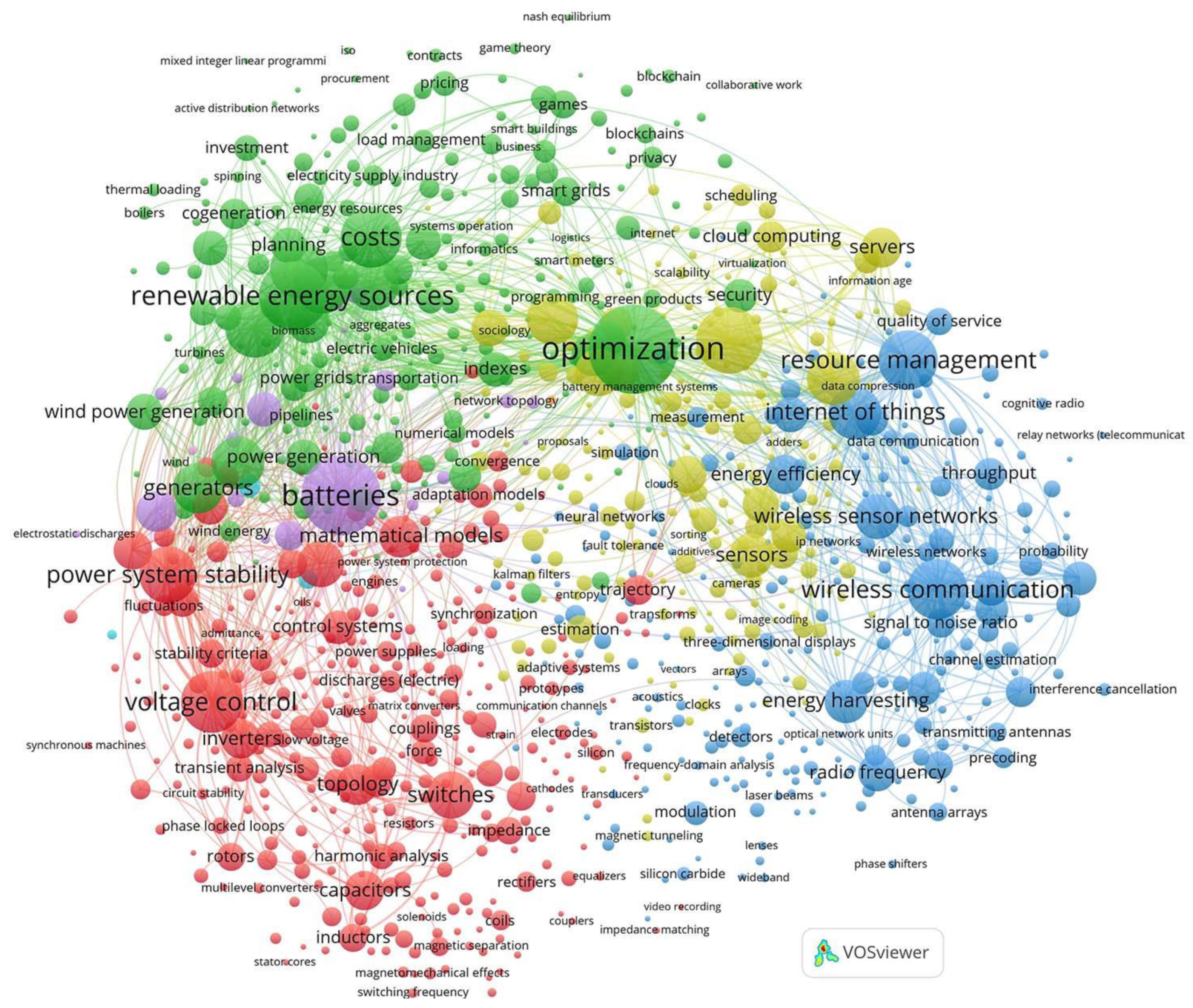
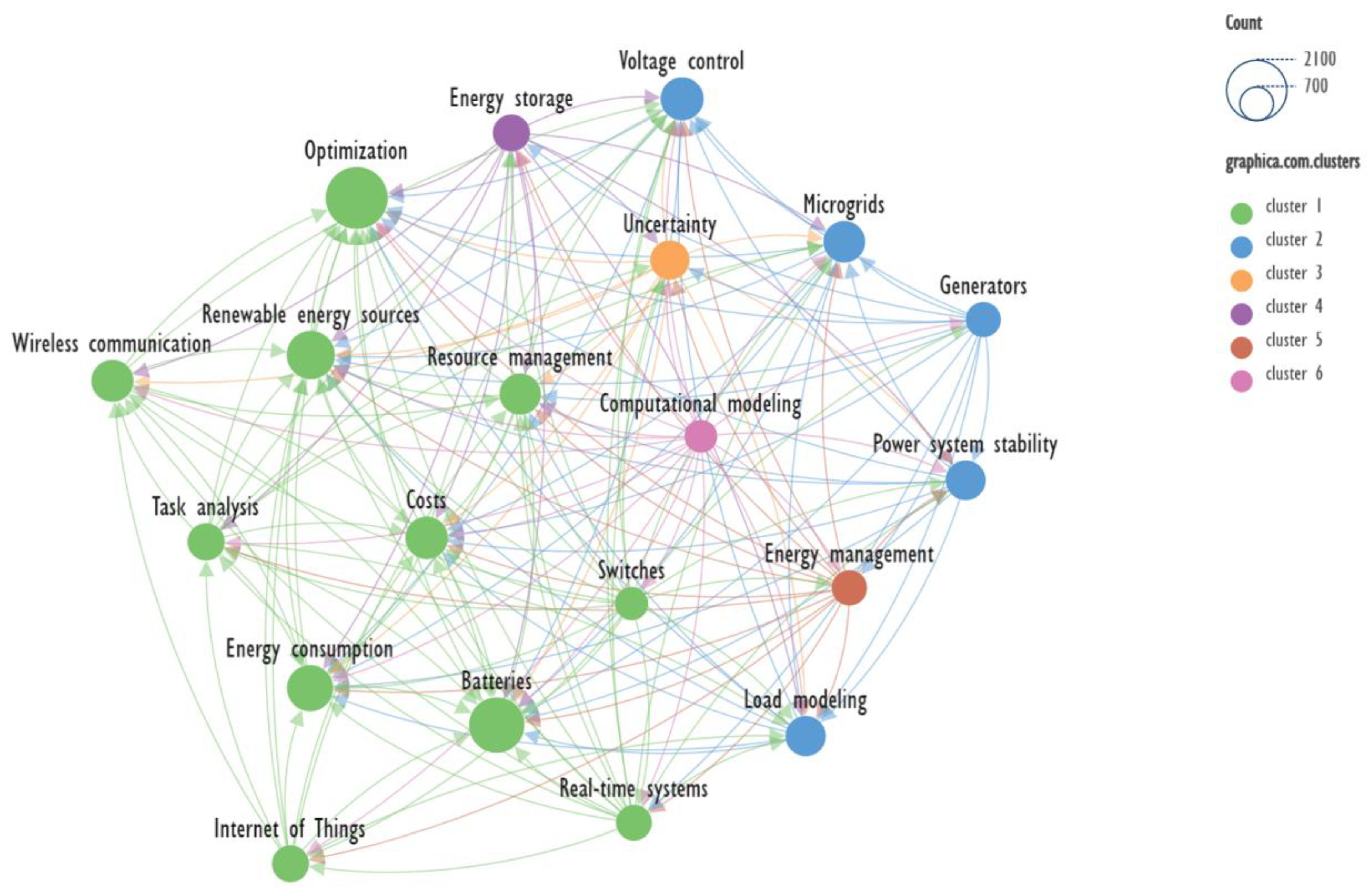
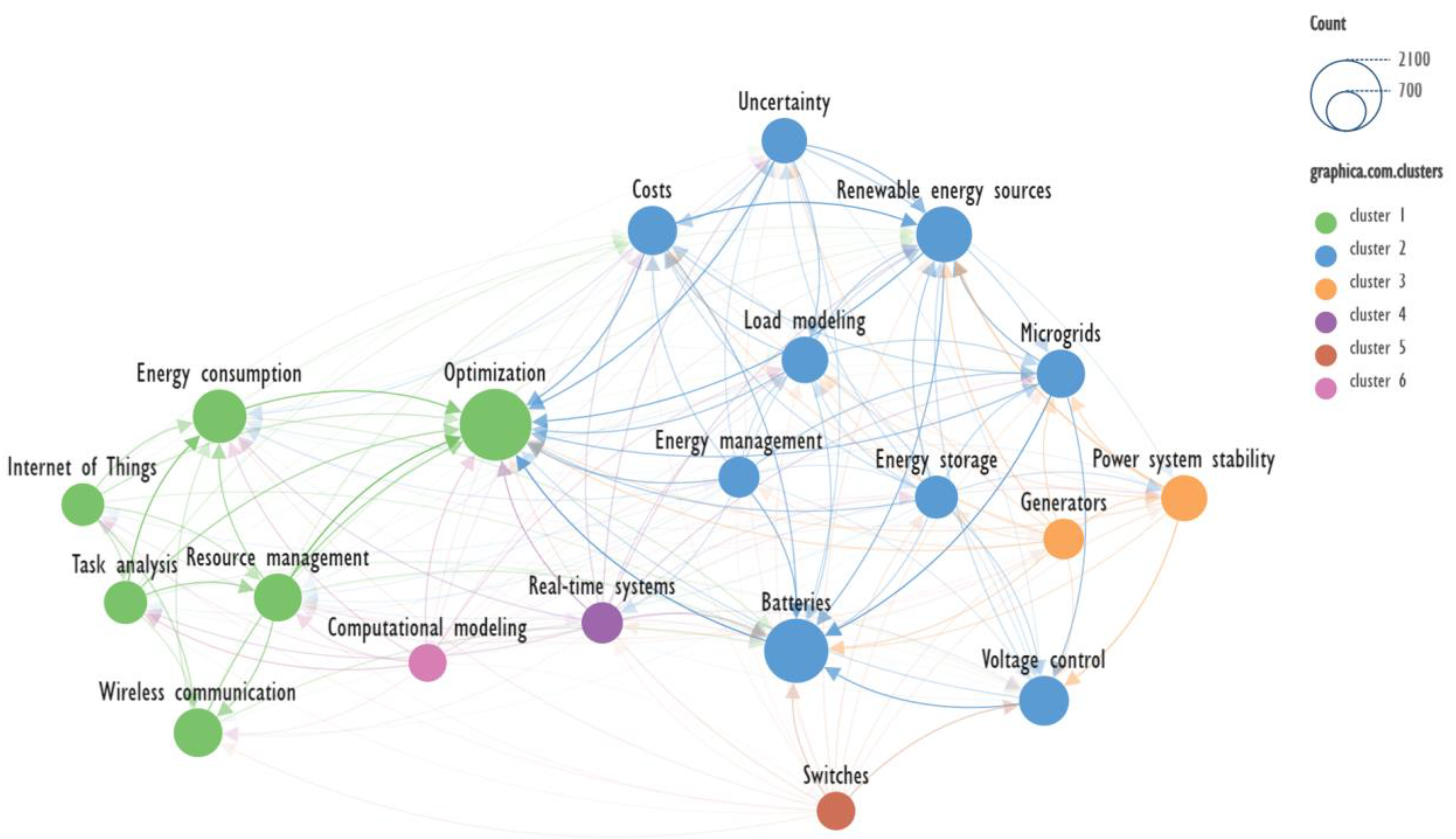
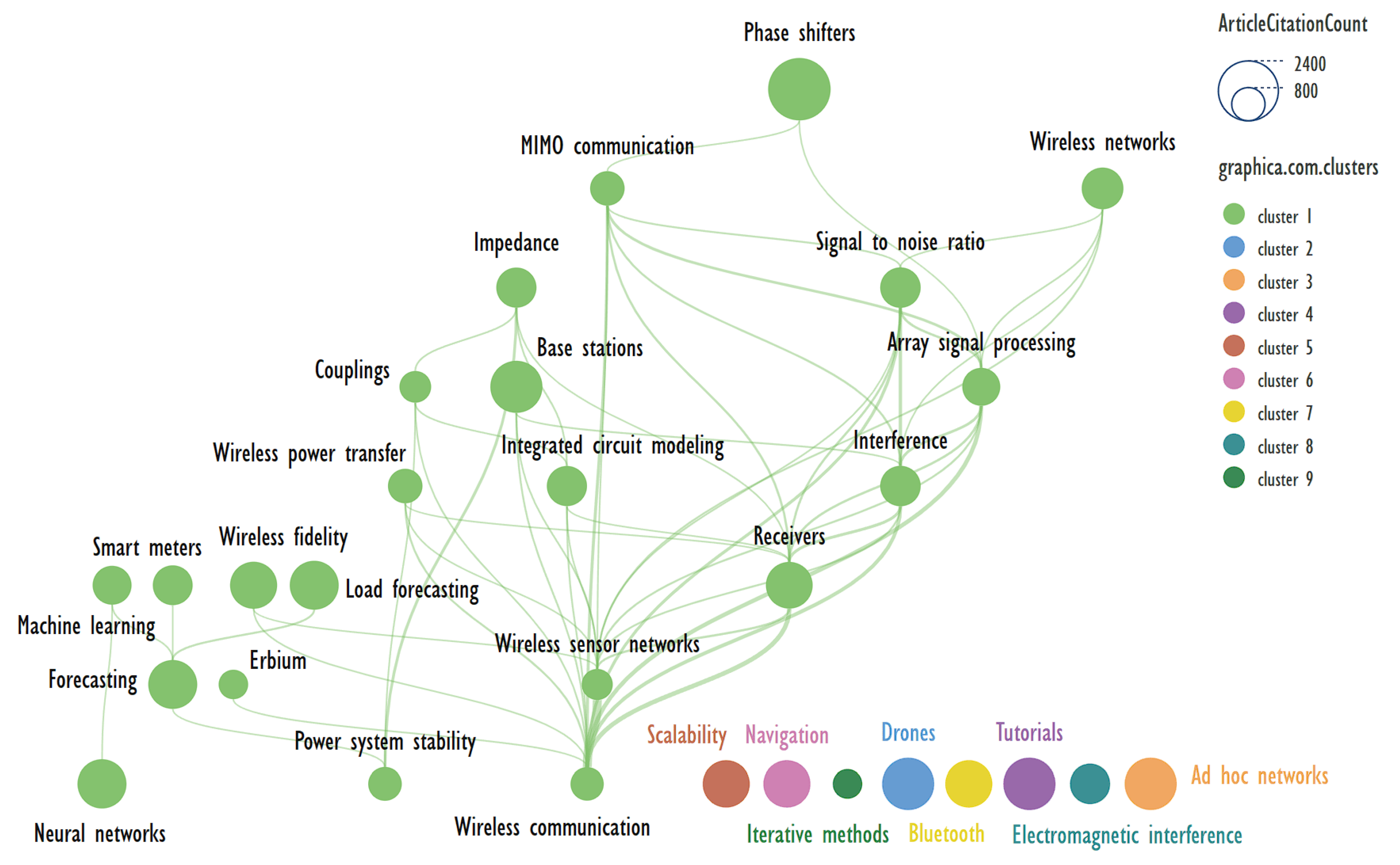
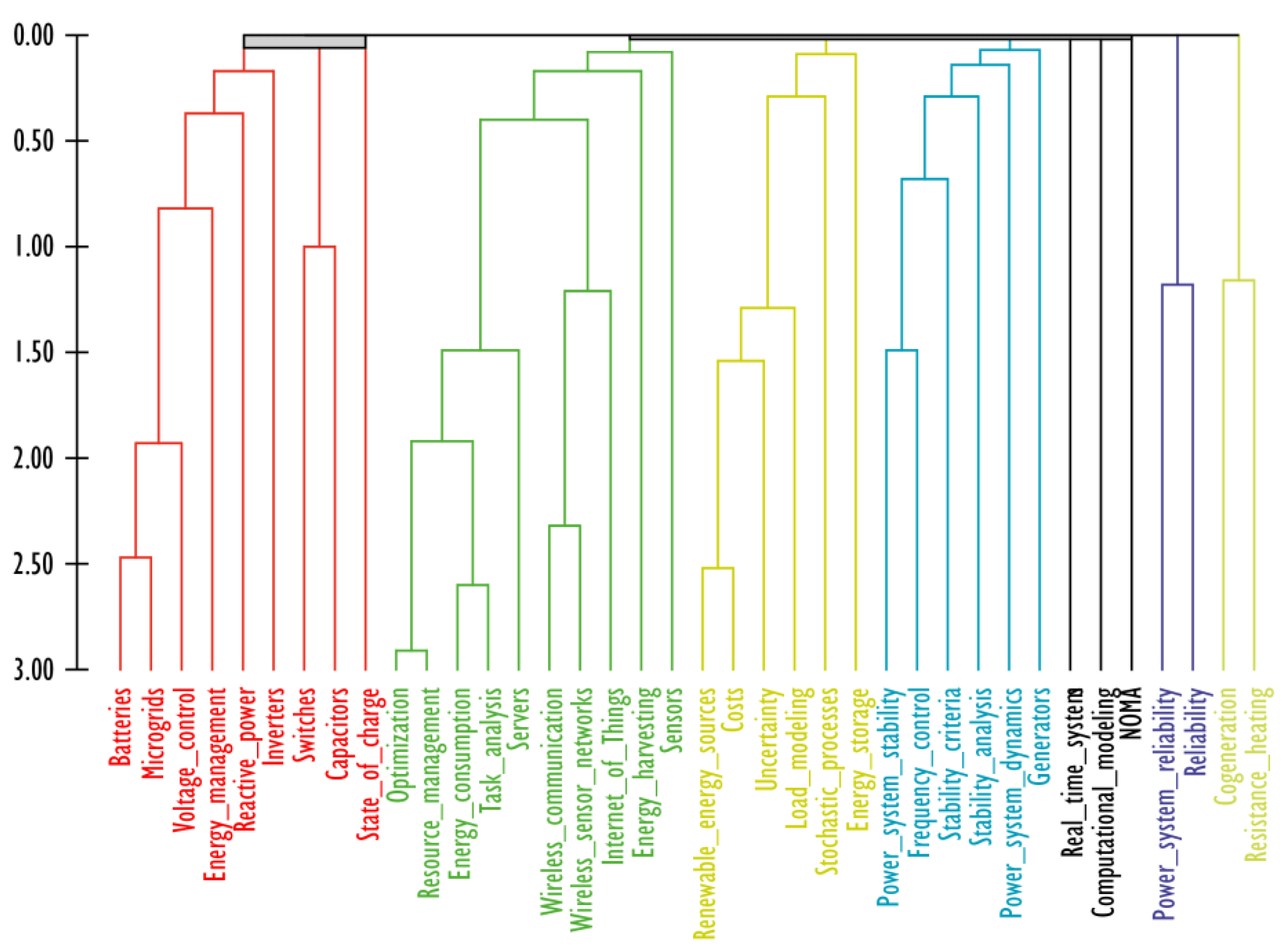
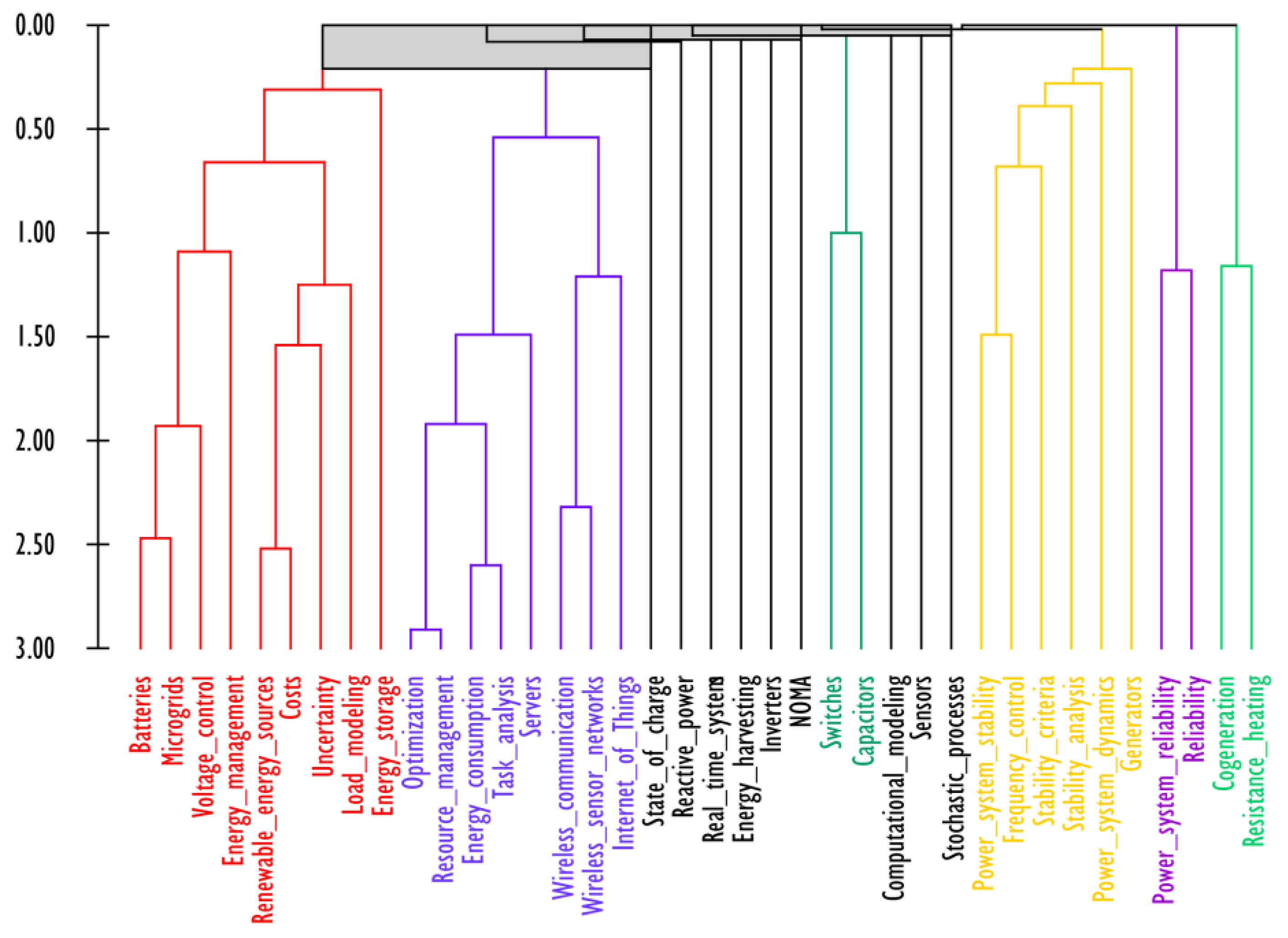
| Journal/IEEE Term | Batteries | Computational modeling | Costs | Energy consumption | Energy management | Energy storage | Generators | Internet of Things | Load modeling | Microgrids | Optimization | Power system stability | Real-time systems | Renewable energy sources | Resource management | Switches | Task analysis | Uncertainty | Voltage control | Wireless communication |
| CSEE Journal of Power and Energy Systems | 26 | 6 | 27 | 5 | 12 | 20 | 16 | 2 | 28 | 20 | 36 | 23 | 12 | 45 | 10 | 10 | 1 | 31 | 20 | 1 |
| IEEE Access | 438 | 113 | 281 | 310 | 207 | 175 | 174 | 142 | 252 | 278 | 512 | 235 | 143 | 472 | 191 | 95 | 131 | 186 | 213 | 168 |
| IEEE Internet of Things Journal | 46 | 46 | 28 | 129 | 18 | 5 | 2 | 339 | 12 | 6 | 118 | 5 | 27 | 12 | 122 | 8 | 121 | 9 | 2 | 116 |
| IEEE Sensors Journal | 10 | 4 | 3 | 15 | 1 | 2 | 14 | 2 | 12 | 4 | 5 | 1 | 6 | 1 | 23 | |||||
| IEEE Systems Journal | 45 | 18 | 37 | 19 | 26 | 23 | 25 | 9 | 51 | 33 | 59 | 28 | 31 | 34 | 27 | 17 | 14 | 28 | 33 | 24 |
| IEEE Transactions on Applied Superconductivity | 9 | 1 | 3 | 1 | 12 | 7 | 4 | 3 | 9 | 7 | 3 | 5 | 11 | 1 | ||||||
| IEEE Transactions on Communications | 13 | 3 | 5 | 13 | 1 | 10 | 1 | 47 | 1 | 1 | 45 | 5 | 15 | 2 | 50 | |||||
| IEEE Transactions on Green Communications and Networking | 23 | 9 | 8 | 38 | 1 | 26 | 2 | 2 | 50 | 4 | 12 | 52 | 5 | 27 | 1 | 47 | ||||
| IEEE Transactions on Industrial Electronics | 71 | 10 | 9 | 14 | 24 | 17 | 24 | 2 | 11 | 26 | 31 | 19 | 13 | 12 | 3 | 41 | 3 | 17 | 64 | 6 |
| IEEE Transactions on Industrial Informatics | 49 | 11 | 24 | 27 | 35 | 21 | 16 | 12 | 44 | 50 | 72 | 23 | 23 | 31 | 13 | 9 | 18 | 48 | 18 | 12 |
| IEEE Transactions on Industry Applications | 116 | 11 | 77 | 9 | 27 | 43 | 55 | 2 | 58 | 84 | 67 | 53 | 27 | 73 | 8 | 38 | 5 | 37 | 106 | 3 |
| IEEE Transactions on Intelligent Transportation Systems | 29 | 4 | 18 | 34 | 12 | 7 | 2 | 6 | 7 | 4 | 39 | 1 | 12 | 6 | 10 | 4 | 7 | 8 | 5 | 10 |
| IEEE Transactions on Power Electronics | 73 | 2 | 6 | 3 | 12 | 31 | 12 | 1 | 6 | 23 | 11 | 25 | 6 | 13 | 65 | 2 | 1 | 75 | 9 | |
| IEEE Transactions on Power Systems | 41 | 38 | 64 | 6 | 22 | 68 | 82 | 79 | 33 | 79 | 108 | 42 | 95 | 18 | 7 | 2 | 92 | 39 | ||
| IEEE Transactions on Smart Grid | 95 | 36 | 78 | 17 | 70 | 59 | 55 | 2 | 90 | 116 | 135 | 44 | 49 | 73 | 19 | 7 | 7 | 101 | 70 | 2 |
| IEEE Transactions on Sustainable Energy | 71 | 19 | 49 | 4 | 21 | 65 | 30 | 1 | 47 | 52 | 87 | 46 | 28 | 78 | 12 | 7 | 2 | 72 | 51 | |
| IEEE Transactions on Transportation Electrification | 54 | 4 | 10 | 15 | 27 | 23 | 3 | 9 | 6 | 29 | 7 | 15 | 11 | 1 | 8 | 3 | 5 | 16 | ||
| IEEE Transactions on Vehicular Technology | 68 | 18 | 12 | 67 | 28 | 5 | 8 | 20 | 5 | 3 | 99 | 2 | 18 | 7 | 93 | 10 | 52 | 7 | 9 | 93 |
| IEEE Transactions on Wireless Communications | 11 | 11 | 1 | 18 | 1 | 1 | 13 | 62 | 1 | 3 | 55 | 5 | 23 | 2 | 107 | |||||
| Journal of Modern Power Systems and Clean Energy | 26 | 6 | 30 | 2 | 12 | 19 | 19 | 38 | 21 | 32 | 28 | 22 | 39 | 6 | 8 | 2 | 39 | 21 |
| IEEEterm/Year | 2019 | 2020 | 2021 | 2022 | 2023 | 2024 |
| Batteries | 293 | 307 | 297 | 269 | 282 | 148 |
| Computational modeling | 91 | 88 | 79 | 112 | 97 | 95 |
| Costs | 54 | 279 | 367 | 242 | ||
| Energy consumption | 210 | 227 | 187 | 190 | 176 | 124 |
| Energy management | 130 | 120 | 102 | 92 | 139 | 71 |
| Energy storage | 127 | 151 | 137 | 108 | 132 | 61 |
| Generators | 116 | 120 | 112 | 115 | 101 | 80 |
| Internet of Things | 111 | 96 | 111 | 127 | 142 | 123 |
| Load modeling | 126 | 159 | 175 | 154 | 139 | 90 |
| Microgrids | 164 | 161 | 181 | 142 | 164 | 92 |
| Optimization | 360 | 361 | 327 | 335 | 362 | 257 |
| Power system stability | 107 | 136 | 142 | 149 | 184 | 106 |
| Real-time systems | 116 | 113 | 115 | 125 | 97 | 96 |
| Renewable energy sources | 118 | 162 | 170 | 267 | 321 | 173 |
| Resource management | 176 | 132 | 140 | 162 | 152 | 127 |
| Switches | 77 | 84 | 104 | 105 | 102 | 105 |
| Task analysis | 85 | 110 | 98 | 136 | 142 | 152 |
| Uncertainty | 105 | 122 | 165 | 123 | 168 | 119 |
| Voltage control | 148 | 128 | 177 | 189 | 193 | 130 |
| Wireless communication | 195 | 142 | 159 | 150 | 158 | 117 |
| Author/IEEE Term | Batteries | Computational modeling | Costs | Energy consumption | Energy management | Energy storage | Generators | Internet of Things | Load modeling | Microgrids | Optimization | Power system stability | Real-time systems | Renewable energy sources | Resource management | Switches | Task analysis | Uncertainty | Voltage control | Wireless communication |
| J. Wang | 18 | 7 | 15 | 23 | 12 | 6 | 4 | 17 | 16 | 11 | 41 | 11 | 8 | 24 | 18 | 11 | 20 | 16 | 13 | 19 |
| X. Li | 23 | 6 | 10 | 15 | 6 | 8 | 7 | 15 | 14 | 12 | 30 | 14 | 12 | 10 | 26 | 10 | 17 | 15 | 18 | 18 |
| H. Li | 15 | 5 | 3 | 10 | 4 | 4 | 8 | 4 | 9 | 6 | 17 | 13 | 6 | 11 | 10 | 7 | 9 | 8 | 8 | 12 |
| H. Zhang | 12 | 10 | 16 | 11 | 12 | 8 | 5 | 8 | 14 | 12 | 42 | 10 | 8 | 14 | 19 | 10 | 16 | 22 | 17 | 19 |
| Y. Wang | 35 | 14 | 19 | 20 | 14 | 21 | 11 | 13 | 24 | 21 | 42 | 19 | 18 | 18 | 17 | 15 | 12 | 13 | 23 | 19 |
| Z. Li | 19 | 9 | 9 | 5 | 7 | 7 | 6 | 12 | 17 | 27 | 5 | 8 | 21 | 16 | 6 | 10 | 19 | 9 | 9 | |
| X. Liu | 16 | 7 | 7 | 11 | 2 | 6 | 4 | 8 | 8 | 13 | 27 | 12 | 10 | 12 | 12 | 9 | 10 | 11 | 14 | 11 |
| Y. Li | 22 | 11 | 19 | 19 | 21 | 17 | 12 | 13 | 15 | 15 | 41 | 19 | 15 | 29 | 29 | 11 | 15 | 15 | 15 | 20 |
| Y. Chen | 20 | 15 | 12 | 17 | 10 | 8 | 2 | 10 | 7 | 4 | 26 | 3 | 9 | 7 | 12 | 10 | 13 | 7 | 7 | 11 |
| J. Liu | 11 | 11 | 14 | 11 | 6 | 14 | 4 | 6 | 13 | 9 | 16 | 7 | 6 | 15 | 11 | 12 | 13 | 12 | 14 | 15 |
| H. Wang | 26 | 7 | 11 | 22 | 9 | 13 | 9 | 12 | 14 | 8 | 37 | 14 | 8 | 15 | 14 | 6 | 17 | 15 | 12 | 10 |
| Y. Xu | 14 | 9 | 15 | 6 | 5 | 13 | 13 | 6 | 15 | 19 | 35 | 13 | 8 | 17 | 16 | 5 | 8 | 27 | 9 | 11 |
| Z. Wang | 13 | 9 | 10 | 24 | 9 | 12 | 10 | 3 | 10 | 7 | 28 | 12 | 3 | 16 | 20 | 10 | 13 | 10 | 17 | 12 |
| X. Wang | 18 | 8 | 17 | 15 | 5 | 11 | 9 | 12 | 18 | 9 | 43 | 14 | 3 | 22 | 24 | 6 | 12 | 18 | 10 | 19 |
| J. Li | 19 | 4 | 21 | 22 | 13 | 9 | 3 | 9 | 16 | 7 | 44 | 6 | 8 | 24 | 18 | 6 | 15 | 11 | 8 | 13 |
| Y. Liu | 29 | 11 | 11 | 25 | 17 | 17 | 10 | 8 | 22 | 14 | 41 | 24 | 16 | 16 | 16 | 19 | 22 | 17 | 19 | 18 |
| Y. Zhang | 29 | 16 | 24 | 34 | 15 | 16 | 11 | 23 | 17 | 10 | 66 | 15 | 10 | 33 | 30 | 9 | 26 | 21 | 18 | 27 |
| X. Zhang | 31 | 11 | 21 | 21 | 4 | 14 | 4 | 8 | 18 | 13 | 29 | 14 | 10 | 26 | 14 | 13 | 13 | 21 | 20 | 15 |
| S. Wang | 16 | 6 | 7 | 8 | 6 | 8 | 8 | 6 | 11 | 8 | 18 | 12 | 8 | 17 | 5 | 5 | 4 | 7 | 13 | 7 |
| J. Zhang | 14 | 6 | 12 | 15 | 3 | 8 | 7 | 7 | 10 | 6 | 34 | 8 | 5 | 13 | 13 | 7 | 10 | 11 | 9 | 16 |
| Author Affiliations/ IEEE Term | Batteries | Computational modeling | Costs | Energy consumption | Energy management | Energy storage | Generators | Internet of Things | Load modeling | Microgrids | Optimization | Power system stability | Real-time systems | Renewable energy sources | Resource management | Switches | Task analysis | Uncertainty | Voltage control | Wireless communication |
| School of Electrical … China | 1 | 13 | 2 | 16 | 14 | 4 | 15 | 9 | 21 | 32 | 7 | 16 | 3 | 6 | 18 | 16 | 4 | |||
| Department of Electrical … China | 39 | 16 | 23 | 19 | 5 | 28 | 14 | 1 | 9 | 10 | 24 | 23 | 6 | 38 | 20 | 1 | 26 | 30 | ||
| School of Electrical … China | 40 | 16 | 40 | 6 | 18 | 6 | 15 | 57 | 20 | 64 | 39 | 12 | 42 | 5 | 17 | 66 | 18 | |||
| College of Energy … China | 7 | 10 | 16 | 7 | 1 | 2 | 6 | 12 | 5 | 30 | 15 | 19 | 24 | 4 | 1 | 38 | 2 | |||
| School of Electric … China | 14 | 4 | 6 | 7 | 6 | 16 | 25 | 12 | 11 | 14 | 2 | 13 | 13 | 11 | 1 | |||||
| School of Electrical … China | 78 | 9 | 42 | 38 | 23 | 28 | 1 | 20 | 26 | 20 | 19 | 20 | 22 | 11 | 24 | 20 | 35 | |||
| School of Electrical … Singapore | 45 | 4 | 18 | 1 | 9 | 29 | 14 | 19 | 51 | 19 | 15 | 10 | 14 | 9 | 3 | 22 | 34 | 4 | ||
| School of Electrical … China | 31 | 12 | 4 | 31 | 15 | 6 | 9 | 8 | 23 | 14 | 14 | 12 | 21 | |||||||
| State Key Laboratory … China | 7 | 9 | 34 | 7 | 16 | 5 | 34 | 20 | 5 | 31 | 45 | 4 | 50 | 8 | 19 | 8 | 31 | 6 | ||
| School of Electrical … China | 7 | 1 | 6 | 2 | 6 | 6 | 11 | 4 | 5 | 11 | 15 | 25 | 7 | 4 | 19 | 22 | 24 | 5 | ||
| College of Electrical … China | 5 | 15 | 18 | 4 | 3 | 15 | 7 | 30 | 15 | 14 | 6 | 11 | 19 | 9 | 4 | 1 | 23 | 7 | 3 | |
| Department of Electrical …India | 55 | 7 | 11 | 2 | 6 | 4 | 6 | 34 | 2 | 9 | 3 | 7 | 24 | 1 | 69 | 1 | ||||
| College of Electrical … China | 14 | 8 | 1 | 10 | 11 | 12 | 11 | 17 | 12 | 31 | 2 | 36 | 1 | 20 | 9 | 24 | 1 | |||
| Department of Energy …Denmark | 30 | 5 | 3 | 3 | 9 | 21 | 8 | 3 | 14 | 43 | 16 | 21 | 5 | 22 | 11 | 13 | 31 | 2 | ||
| College of Electrical … China | 28 | 2 | 15 | 2 | 4 | 32 | 34 | 29 | 14 | 30 | 41 | 12 | 55 | 6 | 17 | 3 | 67 | 40 | ||
| State Key Laboratory …China | 15 | 6 | 11 | 1 | 9 | 15 | 12 | 18 | 25 | 6 | 5 | 4 | 16 | 12 | ||||||
| National Renewable …USA | 19 | 5 | 13 | 14 | 12 | 2 | 33 | 31 | 15 | 8 | 22 | 5 | 3 | 21 | 3 | |||||
| National Mobile …China | 1 | 1 | 19 | 4 | 49 | 5 | 34 | 11 | 25 | |||||||||||
| State Key Laboratory … China | 8 | 19 | 3 | 30 | 29 | 3 | 13 | 3 | 25 | 4 | 29 | 1 | 35 | |||||||
| School of Electrical … Australia | 18 | 4 | 29 | 6 | 4 | 23 | 14 | 3 | 9 | 6 | 22 | 5 | 15 | 20 | 12 | 7 | 6 | 14 | 5 |
| IEEE Term | occurrences | total link strength |
| optimization | 1994 | 11429 |
| batteries | 1594 | 9065 |
| renewable energy sources | 1198 | 7132 |
| energy consumption | 1109 | 6257 |
| voltage control | 957 | 5538 |
| costs | 936 | 5786 |
| wireless communication | 918 | 5223 |
| microgrids | 898 | 5249 |
| resource management | 883 | 5168 |
| load modeling | 842 | 4888 |
| power system stability | 818 | 4744 |
| uncertainty | 799 | 4652 |
| task analysis | 721 | 4135 |
| energy storage | 710 | 4159 |
| internet of things | 708 | 4073 |
| real-time systems | 659 | 3731 |
| energy management | 651 | 3964 |
| generators | 643 | 3723 |
| switches | 576 | 3192 |
| computational modeling | 561 | 3241 |
| mathematical model | 545 | 2953 |
| wireless sensor networks | 510 | 2880 |
| sensors | 495 | 2679 |
| energy harvesting | 476 | 2684 |
| reliability | 476 | 2689 |
| power systems | 457 | 2646 |
| mathematical models | 448 | 2608 |
| topology | 434 | 2462 |
| reactive power | 425 | 2453 |
| servers | 409 | 2412 |
Disclaimer/Publisher’s Note: The statements, opinions and data contained in all publications are solely those of the individual author(s) and contributor(s) and not of MDPI and/or the editor(s). MDPI and/or the editor(s) disclaim responsibility for any injury to people or property resulting from any ideas, methods, instructions or products referred to in the content. |
© 2024 by the authors. Licensee MDPI, Basel, Switzerland. This article is an open access article distributed under the terms and conditions of the Creative Commons Attribution (CC BY) license (http://creativecommons.org/licenses/by/4.0/).





